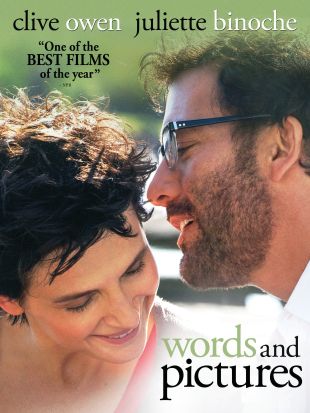A smart, funny, well-written, and beautifully acted romantic comedy-drama seems to be a tough order for Hollywood to fill these days, but Fred Schepisi's charming indie Words and Pictures delivers just that.
The movie stars Clive Owen as Jack, a onetime successful author who is currently the charismatic English teacher at an exclusive East Coast prep school. His style is to needle and engage his students, but his behavior has grown erratic and his writing career nonexistent as his alcoholism has worsened, and he's informed that he might be let go after his upcoming performance review. When new art teacher Dina Delsanto (Juliette Binoche), whose rheumatoid arthritis keeps her from painting, joins the staff, he tries repeatedly to break through her shell. In order to stoke a fire in his pupils and get Dina's attention, Jack proposes a contest in which the students debate whether words or pictures are the more powerful art form. Eventually, his playful feuding with Dina leads to a more serious connection.

Working from a first-rate script by Gerald Di Pego, Schepisi and the cast strike the perfect balance between comedy and drama throughout the movie. The banter between the two teachers occasionally snaps as sharply as the dialogue in classic screwball comedies did, and the dramatic turns, especially Jack's painful interactions with his adult son, don't succumb to pathos because Owen has no interest in unfairly earning the audience's sympathy. He makes sure Jack's worst character flaws -- accentuated by his drinking problem -- remain on display.
Clive Owen always brings a strong masculine presence to his roles -- he would have made a fascinating James Bond -- and while that's certainly true here as well, he tempers it with the character's erudite playfulness. He makes Jack charming but untrustworthy: a self-destructive, aggressive intellectual. Juliette Binoche's Dina, on the other hand, has cut herself off from the world out of bitterness. She's angry that she can't make art and that she's forced to use crutches to get around. Binoche ensures that her character doesn't melt quickly or easily for Jack's audacious flirtations. They may be playing English and art teachers, but this movie works so well because of their chemistry.

The story here doesn't surprise, but it works because of how well-observed the characters are. Their interactions are familiar not because we've seen these arcs before, but because they behave like real-life people do, in all their complex glory. The running debate in the movie is lighthearted, but the film eventually proves, both via its own quality and the love story at its center, that mixing words and pictures is far more rewarding than judging them against each other.
